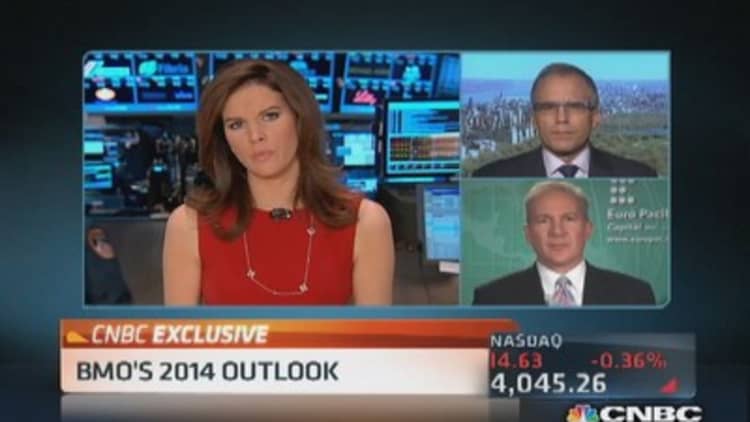
The New Year is still weeks away, but that hasn't stopped some market observers from making forecasts for 2014.
Euro Pacific Capital CEO Peter Schiff, an investor probably best known for correctly predicting that a housing market crash would overwhelm the financial system, has a fairly bearish outlook.
"I think investors are really underestimating the severity of the problems that underlie the structure of the U.S. economy and the degree at which the Fed is masking and actually exacerbating those problems with QE," Schiff told "Closing Bell" on Monday. He was referring to the Federal Reserve's $85 billion monthly purchase of Treasurys and monthly agency mortgages to spur the economy.
There has been a lot of talk lately about when the Fed might begin dialing back the bond-buying program, but Schiff doesn't expect a taper in 2014 as Vice Chair Janet Yellen steps in to succeed Chairman Ben Bernanke.
But the Fed's unprecedented stimulus program will all but destroy the value of the dollar, he said, because the central bank is able to buy all those Treasurys only by printing more money. The more money that's printed, the less the dollar is worth, he said.
He recommends that investors buy gold and get exposure to foreign markets in the new year.
Brian Belski of BMO Capital Markets is less optimistic about 2014 than past years. His firm expects mid-single-digit gains, with a 2014 year-end price target of 1,900 on the S&P 500.
Unlike Schiff, though, he thinks the economy appears poised for a breakout, with gross domestic product to strengthen to 2.7 percent.
"We think that the first half of the year is going to be much more bullish and, oh, by the way, we think the market peak will be well above 1,900 for the first half ... somewhere in 2,000-plus on the print," Belski said. "However, we think ultimately tapering will be the scapegoat to the pullback, and then I think we close at 1,900. In fact, I think we could be significantly below 1,900 in the third or fourth quarter and then rally back up at the end of the year."
—By CNBC's Drew Sandholm. Follow him on Twitter @DrewSandholm.


